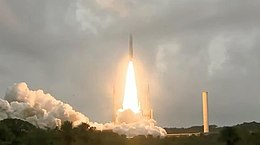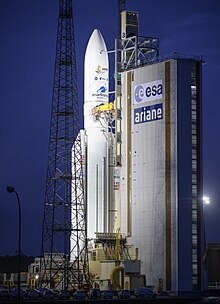Ariane flight VA256
 Ariane 5 containing the James Webb Space Telescope moments after lift-off | |
| Ariane 5 ECA launch | |
|---|---|
| Launch | 12:20:00, 25 December 2021 (UTC) (2 years ago)[1] |
| Pad | ELA-3 |
| Payload | |
| Outcome | Success[2] |
| Ariane launches | |
Ariane flight VA256 was an Ariane 5 rocket flight that launched the James Webb Space Telescope into space on 25 December 2021.[3] It was 2021's final Ariane flight, its most valuable payload to date, and the 256th Ariane mission. The launch was described by NASA as "flawless" and "perfect".[4]
Launch configuration[edit]
Rocket[edit]
Ariane 5 is a heavy lift two-stage rocket with two solid fuel boosters. It was used in its ECA variant, which offers the highest payload mass capacity. The total launch mass of the vehicle is of the order of 770,000 kg (1,700,000 lb).
Payload[edit]
The only payload on the flight was the James Webb Space Telescope (JWST), a NASA/ESA space-based observatory. The launch is one of the European Space Agency's contributions to the project.[5][3] The telescope had a launch mass of about 6,500 kg (14,300 lb) and a design lifetime of 5 to 10 years.
Preparation campaign[edit]
Arrival in Kourou[edit]
The payload arrived in Kourou, French Guiana, on 12 October 2021 where it was unloaded from the MN Colibri cargo ship and transported to the space centre.[6]

Integration incident[edit]
On 22 November 2021 an incident was reported by NASA and Arianespace that a clamp band securing the payload to the adapter was released during integration activities, causing vibrations to the telescope.[7] After some tests were performed, a review board concluded on 24 November 2021 that no payload component was damaged, and fuelling operations could be started on the next day, with the launch planned for 22 December 2021 at that time.[8][9]
Fuelling operations[edit]

Spacecraft fuelling operations began on 25 November 2021,[8] the fuelling system was disconnected on 3 December 2021, and verifications were concluded on 5 December 2021. The telescope's fuel system was filled with approximately 168 kg (370 lb) of hydrazine and 133 kg (293 lb) of dinitrogen tetroxide, needed to reach and maintain its orbit after separation from the launch vehicle.[10]
Final assembly[edit]
Following the rocket, which had already arrived on 29 November 2021, the telescope was moved to the final assembly building (Bâtiment d’Assemblage Final or BAF) on 7 December 2021.[11] The payload was encapsulated inside the fairing on top of the rocket on 21 December 2021.[12]
Interface communication issue[edit]
On 14 December 2021, a joint press release by NASA and Arianespace revealed that "a communication issue between the observatory and the launch vehicle system" was being tackled, further delaying the launch to no earlier than 24 December 2021.[13][3]
Weather issue[edit]
Unfavorable weather forecasts for 24 December 2021 delayed the launch to Christmas Day, 25 December 2021.[1]

Launch[edit]

The rocket was launched from the ELA-3 launch pad of the Guiana Space Centre on 25 December 2021 at 12:20 UTC (09:20 local time, 7:20 am U.S. EST).[14] The DDO (in French: Directeur des Opérations) of the launch was Jean-Luc Voyer, who concluded his shift by saying, "Go Webb!"[15]
The launch was described by NASA as "flawless" and "perfect".[4] A NASA systems engineer said “the efficiency or the accuracy with which Ariane put us on orbit and our accuracy and effectiveness in implementing our mid-course corrections” meant that there is “quite a bit of fuel margin ... roughly speaking, it’s around 20 years of propellant.”[16][17]
Orbit[edit]
The James Webb Space Telescope was injected into a transfer trajectory that took it to the second Earth-Sun Lagrange point (L2).
The separation of the launch vehicle second stage and the spacecraft occurred approximately 27 minutes after liftoff.[18] The second stage downloaded video, the last known time the telescope will be seen, of the separation and initial deployment of the solar panels.[18] After this separation, the telescope became autonomous and began its deployment sequence. About 29 days after liftoff, it executed a maneuver placing it into a halo orbit around the L2 point, where it can perform its science mission. Its next five months were spent on cooling NIRCam and the Mid-Infrared Instrument down further, calibrating its mirrors while focusing on HD 84406, a bright star in the constellation Ursa Major, and testing the instruments.[19][20][21]
See also[edit]
- James Webb Space Telescope
- Timeline of the James Webb Space Telescope
- Launch and commissioning of the James Webb Space Telescope
- Ariane launches
References[edit]
- ^ a b Loff, Sarah (21 December 2021). "James Webb Space Telescope Launch Update". NASA. Retrieved 21 December 2021.
- ^ Strickland, Ashley. "The most powerful telescope ever built has successfully launched". CNN. CNN. Retrieved 25 December 2021.
- ^ a b c "Ariane Flight VA256". arianespace.com. Arianespace. 25 December 2021. Retrieved 25 December 2021.
- ^ a b Tereza Pultarova (25 December 2021). "'It's truly Christmas': James Webb Space Telescope's yuletide launch has NASA overjoyed". Space.com.
- ^ "European agreement on James Webb Space Telescope's Mid-Infrared Instrument (MIRI) signed". esa.int. European Space Agency. 10 June 2004. Retrieved 15 December 2021.
- ^ Fisher, Alise (28 October 2021). "The Journey to Kourou". NASA Blogs. NASA. Retrieved 1 December 2021.
 This article incorporates text from this source, which is in the public domain.
This article incorporates text from this source, which is in the public domain.
- ^ Fisher, Alise (22 November 2021). "NASA Provides Update on Webb Telescope Launch". NASA Blogs. NASA. Retrieved 1 December 2021.
 This article incorporates text from this source, which is in the public domain.
This article incorporates text from this source, which is in the public domain.
- ^ a b Fisher, Alise (24 November 2021). "Testing Confirms Webb Telescope on Track for Targeted December 22 Launch". NASA Blogs. NASA. Retrieved 1 December 2021.
 This article incorporates text from this source, which is in the public domain.
This article incorporates text from this source, which is in the public domain.
- ^ "Testing Confirms Webb Telescope on Track for Targeted December 22 Launch". arianespace.com. Arianespace. 25 November 2021. Archived from the original on 1 December 2021. Retrieved 1 December 2021.
- ^ Fisher, Alise (6 December 2021). "NASA's James Webb Space Telescope Fully Fueled for Launch". NASA Blogs. NASA. Retrieved 21 December 2021.
- ^ Garner, Rob (9 December 2021). "Webb Moved to Meet its Rocket". NASA Blogs. NASA. Retrieved 21 December 2021.
- ^ Clark, Stephen (18 December 2021). "Webb telescope encapsulated inside Ariane 5 rocket's nose cone". Spaceflight Now. Retrieved 21 December 2021.
- ^ Fisher, Alice (14 December 2021). "Webb Space Telescope Launch Date Update – James Webb Space Telescope". NASA Blogs. Retrieved 15 December 2021.
 This article incorporates text from this source, which is in the public domain.
This article incorporates text from this source, which is in the public domain.
- ^ "Ariane 5 goes down in history with successful launch of Webb". arianespace.com (Press release). Arianespace. 25 December 2021. Retrieved 25 December 2021.
- ^ "Vidéo. Télescope James Webb : revivez en vidéo le lancement historique d'un titan de l'espace". Le Monde.
- ^ Carter, Jamie (10 January 2022). "The Webb Space Telescope is fully deployed and 'could now last 20 years' says NASA. But what happens next?". Forbes. Archived from the original on 10 January 2022. Retrieved 11 January 2022.
- ^ Berger, Eric (10 January 2022). "All hail the Ariane 5 rocket, which doubled the Webb telescope's lifetime". www.arstechnica.com. Ars Technica. Retrieved 11 January 2022.
- ^ a b James Webb Space Telescope separation, retrieved 10 January 2022
- ^ Boyle, Alan (24 January 2022). "Webb Telescope fires thrusters to settle in at destination, a million miles from Earth". GeekWire. Retrieved 25 January 2022.
- ^ Grush, Loren (25 January 2022). "What's next for NASA's James Webb Space Telescope now that it's reached its parking spot". The Verge. Vox Media LLC. Retrieved 25 January 2022.
- ^ "Orbit - Webb/NASA". NASA. Retrieved 12 December 2021.
 This article incorporates text from this source, which is in the public domain.
This article incorporates text from this source, which is in the public domain.




